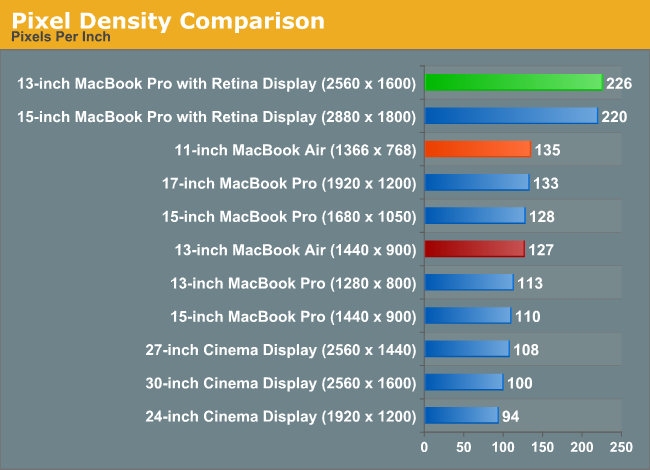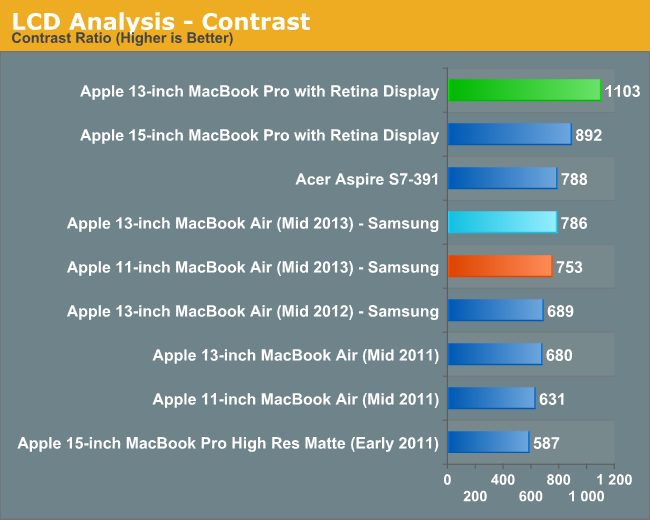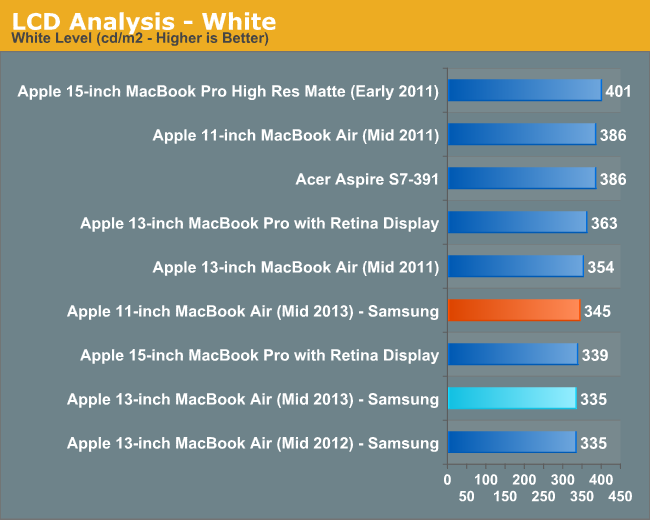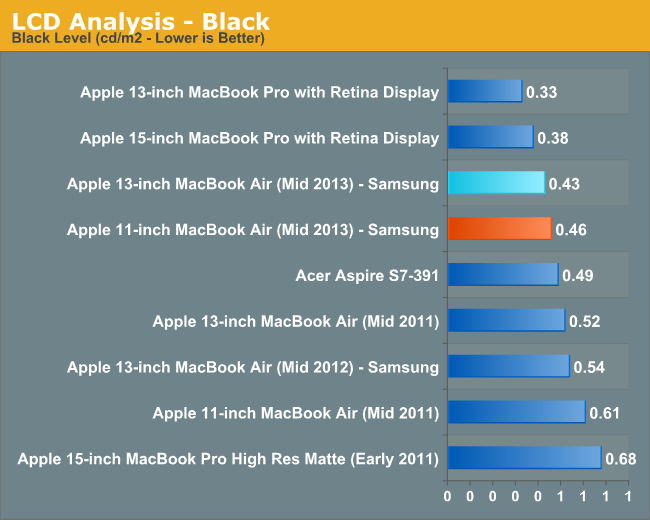The 2013 MacBook Air Review (11-inch)
by Vivek Gowri on August 9, 2013 1:45 AM ESTThe 11.6” Samsung display panel in my Air evaluation unit is actually the same one I had on my last MacBook Air, though the one before that had an LG panel. This is all based on the panel supply lottery, and while it’s been alleged that the Samsung is a superior quality panel in terms of contrast and viewing angles, I honestly can’t say there’s too much of a difference overall between the two. I’ve never had them side-by-side, and color calibration can certainly skew visual perception significantly, so let’s just say that your mileage may vary. If you don’t like the panel you get, take it back and try another one—Apple Stores seem to cater to discerning customers (or they have with me).
 Obviously, given our familiarity with the Air 11”, there’s nothing surprising here with the 2013 edition. It’s roughly the same as the last few we’ve had, beyond standard panel to panel variations. Contrast ratio and color reproduction are pretty decent, as they were before, and viewing angles are solid by the standards of TN panels. This is still the best 11.6” TN panel I think I’ve come across, but it’s been eclipsed many times over by the 1080p IPS 11.6” panels that are shipping in basically any higher-end 11.6” Ultrabook these days.
Obviously, given our familiarity with the Air 11”, there’s nothing surprising here with the 2013 edition. It’s roughly the same as the last few we’ve had, beyond standard panel to panel variations. Contrast ratio and color reproduction are pretty decent, as they were before, and viewing angles are solid by the standards of TN panels. This is still the best 11.6” TN panel I think I’ve come across, but it’s been eclipsed many times over by the 1080p IPS 11.6” panels that are shipping in basically any higher-end 11.6” Ultrabook these days.


 This is probably the biggest issue that I have with the 11” Air. The 11.6” 1366x768 TN panel was industry standard when the first Air 11” hit the market, and the panel quality was actually pretty decent. The display size, pixel density, and aspect ratio each specifically aren’t bad on their own, but the combination results in a pretty unsatisfying viewing experience in this day and age. I’ve never liked the 1366x768 resolution for notebook displays, regardless of panel size; the lack of vertical pixels just kills it for me. Even 1280x800 in the 13” MacBook Pro (non-Retina) is better. I don’t mind 16:9 as an aspect ratio, even at this size, but I just want more pixels. That’s really the biggest part of what makes the 13” so much more usable, the 1440x900 display in that also won’t blow you away in terms of dot pitch or even visually when compared to the Retina MacBook Pro or a modern Ultrabook, but it offers a much more pleasant experience than this 11.6” panel.
This is probably the biggest issue that I have with the 11” Air. The 11.6” 1366x768 TN panel was industry standard when the first Air 11” hit the market, and the panel quality was actually pretty decent. The display size, pixel density, and aspect ratio each specifically aren’t bad on their own, but the combination results in a pretty unsatisfying viewing experience in this day and age. I’ve never liked the 1366x768 resolution for notebook displays, regardless of panel size; the lack of vertical pixels just kills it for me. Even 1280x800 in the 13” MacBook Pro (non-Retina) is better. I don’t mind 16:9 as an aspect ratio, even at this size, but I just want more pixels. That’s really the biggest part of what makes the 13” so much more usable, the 1440x900 display in that also won’t blow you away in terms of dot pitch or even visually when compared to the Retina MacBook Pro or a modern Ultrabook, but it offers a much more pleasant experience than this 11.6” panel.










139 Comments
View All Comments
repoman27 - Friday, August 9, 2013 - link
For some reason Apple is still using Cactus Ridge DSL3510L 4C controllers in the 2013 Airs.Technically the configuration could drive any 4K display on the market just fine, even with only a single port exposed. The problem is the lack of daisy-chainable Thunderbolt devices with dedicated DisplayPort / HDMI 1.4 / dual-link DVI ports.
Theoretically, you could build a device in the $80 retail range with two Thunderbolt controllers and two DP ports just to drive 4K displays.
Darkfire - Friday, August 9, 2013 - link
I'm impressed with the listed 7 hours of battery life on the Macbook Pro (Early 2011). I have gfxCardStatus and keep it forced on integrated most of the time, and usually get around 5 and a half.darwinosx - Friday, August 9, 2013 - link
Why does Vivek do Apple anything reviews? He makes many mistakes while progressing to prefer Windows. Leave the Mac reviews to Anand who knows what he is talking about and does not have an anti-Apple bias.Also how is their no performance improvement when the sad is twice as fast and destroys anything else on the market? You know the SSD's that you didn't event set or show stats for? Ridiculous.
KPOM - Friday, August 9, 2013 - link
Since the 11" and 13" MacBook Air models have the same processors this year, (both in base and upgrade form), apart from the impact of thermals the performance should be pretty similar. I think a separate review from someone else is warranted. As for pro- or anti-Apple bias, let's face it. While Apple legitimized and mainstreamed the ultraportable category (which was largely restricted until 2010 to an ultra-expensive and underpowered niche), most people use Windows. It's good to get some different perspectives.ananduser - Saturday, August 10, 2013 - link
"Mainstreamed" is a stretch; only by virtue of their limited lineup and by positioning ultrabook skus at the low end. I'm saying average macusers aren't rushing for the form factor but for the entry level price. In the Windows world ultrabooks are still a niche because more inexpensive alternatives exist.KPOM - Saturday, August 10, 2013 - link
Regardless of why, the bottom line is that before October 2010, ultraportables (including the earlier MacBook Air) were not very popular and were mostly executive toys. After October 2010, they became popular and as sales of the MacBook Air improved, more manufacturers started making them.The 13" MacBook Pro has outsold the MacBook Air, so I doubt that it was solely price that drove MacBook Air sales. I think people genuinely like the smaller form factor. I've long preferred ultraportables and was an early MacBook Air buyer (February 2008). The only reason I switched was for the Retina Display on the 13" rMBP.
solipsism - Friday, August 9, 2013 - link
1) Maybe they think they are being more "objective" by having someone make such subjective, anti-Apple comments in some of their Apple-released reviews.2) Anand already tackled the new SSD last month, as well as the new 13" MBA.
• http://www.anandtech.com/show/7058/2013-macbook-ai...
• http://www.anandtech.com/show/7085/the-2013-macboo...
VivekGowri - Saturday, August 10, 2013 - link
I'm somehow characterized as an Apple fanboy by the other notebook editors on staff, but I'm glad that you can look past that and make sure someone who's literally owned every Apple product released over the last five years other than the Mac Pro can be called out for hating Macs. That takes a lot of analytical depth and strength of reason.Refresh my memory though, where do I say anything particularly anti-Apple? Or that I prefer Windows? I ask only because OS X has been my primary mobile OS for the better part of the last three years, and if you have insight into my tastes that perhaps I am not aware of, I should heed your advice and move off the platform.
VivekGowri - Saturday, August 10, 2013 - link
Also, Haswell IPC stayed flat relative to IVB. Lowering clock speed naturally means that CPU performance goes down. Deal with it. I mentioned that the SSD helps balance the performance gap in daily usage, but damn if you can use it to claim a typical generational bump in raw compute power. That's not the point of Haswell, but it's still important to recognize the strengths and faults of the platform. Did you actually read the review?nerd1 - Saturday, August 10, 2013 - link
There are lots of mSATA RAID 0 setups among new windowsbooks, and they are a) just as fast b) user expandable c) WAY cheaper than proprietary solution.And I highly doubt MBA can do any serious task that can benefit from faster SSD.